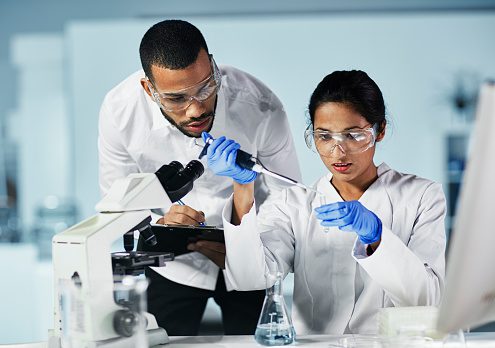
| Laboratory Assistant Key Stats | |
|---|---|
| Education | 1-2 Years |
| Job Outlook | 11% |
Laboratory Assistants, also referred to as Medical Laboratory Assistants (MLS) are professionals who work in the medical field preparing specimens and samples for laboratory testing.
These professionals must have strong attention to detail as they handle biological specimens needed to perform a variety of medical tests.
Table of Contents
Education Requirements to Become a Laboratory Assistant
Individuals who want to become a Laboratory Assistant need a combination of skills and education to enter this profession.
Individuals who want to become a Laboratory Assistant only need a high school diploma for entry level positions.
However, most employers look for individuals who have at least an associate’s degree or several years of experience in the health care field.
Individuals must focus their associate’s degree in an applied science, life science, medical laboratory or a closely related field that provides hands on laboratory experience.
Some additional recommended courses include classes in mathematics, biology and chemistry and lab procedures.
In addition to an associate’s degree in any of these fields, individuals must also work on specific skills that will help them succeed in this profession.
Individuals who want to become a Laboratory Assistant must also be skilled in being detail oriented, diligent, communication skills and be able to work well in a team.
These skills are important because of the handling of several separate specimens for many different patients and for the prompt completion and analysis of tests for different medical departments.
Individuals who want to become a Laboratory Assistant may have to seek certification, but it depends on the state they live in.
If not state mandated, individuals will still benefit from certification because of the guidelines, professionalism and education a certification requests.
Certified individuals will show potential employers that they are committed to their line of work.
Visit the
American Society for Clinical Pathology (ASCP) for more information on certification and other programs and professions.
Laboratory Assistant Job Description
Laboratory Assistants are responsible for using advanced technology to conduct testing on biological specimens collected from a patient.
Typical specimens may include: blood, urine, tissues and other bodily fluids.
Laboratory Assistants must wear protective masks, gloves and goggles because of their contact with biological fluids.
This is both for the Laboratory Assistant’s protection and also to reduce any contamination to the samples.
Under the supervision of a Laboratory Technician, a Laboratory Assistant will analyze and test samples of blood, urine or other bodily fluids.
After a sample is done with the diagnostic tests, a Laboratory Assistant may also transfer the results to a patient’s medical file assuring there is no cross information being reported.
The type of testing done under the microscope will include searching for objects such as parasites, infections, bacteria, microorganisms or other things not common in the human body.
They will also glean information from tests useful in diagnosing medical ailments and other conditions.
In addition, Laboratory Assistants will be responsible for keeping the laboratory clean and up to code, register samples, log test results and order necessary lab equipment.
Laboratory Assistant Salary and Career Path
The median annual salary for Medical and Clinical Laboratory Technologists and Technicians, which includes Laboratory Assistants was approximately $37,240 in 2012.
Exact wages will depend on the level of experience and employer an individual works for.
Professionals in this industry work full time and may work nontraditional hours because of the round the clock hours that hospitals and laboratories have in place.
Round the clock hours may include graveyard shifts, evening, weekend or holiday hours.
An increase in the aging population, who require frequent medical attention, will cause an increase in medical services.
This demand will prompt an increase in jobs in this field by 30 percent through 2022.
The demand for laboratory personnel will help increase access for patients needing this type of service.
Individuals pursuing a career as a Laboratory Assistant can look forward to healthy job projections, good wages and the ability to use their attention to detail to handle and test specimens collected from their patients.
Because this is an entry level position, Laboratory Assistants may also have plenty of opportunities for advancement in other professions in the health care system.
![]() The below information is based on the 2023 BLS national averages.
The below information is based on the 2023 BLS national averages.
National Average Salary
$62,870Average Salary by State
| State | Avg. Annual Salary |
|---|---|
| Alabama | $49,700 |
| Alaska | $69,270 |
| Arizona | $63,710 |
| Arkansas | $51,590 |
| California | $73,560 |
| Colorado | $67,460 |
| Connecticut | $76,190 |
| Delaware | $70,410 |
| District of Columbia | $71,690 |
| Florida | $58,450 |
| Georgia | $63,270 |
| Hawaii | $67,170 |
| Idaho | $51,910 |
| Illinois | $64,850 |
| Indiana | $56,680 |
| Iowa | $54,770 |
| Kansas | $59,780 |
| Kentucky | $56,820 |
| Louisiana | $60,120 |
| Maine | $65,810 |
| Maryland | $60,640 |
| Massachusetts | $70,270 |
| Michigan | $59,140 |
| Minnesota | $65,900 |
| Mississippi | $45,820 |
| Missouri | $57,840 |
| Montana | $66,350 |
| Nebraska | $62,320 |
| Nevada | $62,620 |
| New Hampshire | $74,920 |
| New Jersey | $70,800 |
| New Mexico | $52,660 |
| New York | $81,930 |
| North Carolina | $56,990 |
| North Dakota | $63,070 |
| Ohio | $60,570 |
| Oklahoma | $55,780 |
| Oregon | $76,830 |
| Pennsylvania | $60,940 |
| Rhode Island | $72,200 |
| South Carolina | $54,370 |
| South Dakota | $56,340 |
| Tennessee | $59,330 |
| Texas | $57,080 |
| Utah | $52,320 |
| Vermont | $75,660 |
| Virginia | $61,810 |
| Washington | $70,670 |
| West Virginia | $59,250 |
| Wisconsin | $59,520 |
| Wyoming | $60,900 |
| Puerto Rico | $38,260 |
| Virgin Islands | $51,780 |
The top earning state in the field is New York, where the average salary is $81,930.
These are the top 5 highest-paying states in the field:
* Employment conditions in your area may vary.
Frequently Asked Questions
What does a laboratory assistant do?
Laboratory assistants work in labs and help the laboratory director with processing specimens and conducting tests.
They may also have to perform a variety of administrative tasks such as cleaning and sanitizing the equipment and recording data.
Laboratory assistants usually work full time but may also work overtime when they have to finish a project.
They sometimes have to work with specimens and materials that are dangerous so it is very important to follow strict safety and sanitation procedures.
In order to be able to perform all the above tasks, lab assistants need a variety of skills, including analytical skills, dexterity, computer skills, the ability to operate sophisticated lab equipment, physical fitness, and attention to detail.
How much does a laboratory assistant make?
According to the Bureau of Labor Statistics, the median annual salary for clinical laboratory technologists and technicians was $52,330 as of May 2018.
However, salaries in this field vary based on a wide range of factors; some earn less than $30,000 a year, while others make more than $80,000.
How much does it cost to become a laboratory assistant?
To become a laboratory assistant you will need at least an associate’s degree or a postsecondary certificate in biology, biotechnology or a related field.
Costs vary depending on the school you choose; for example, a two-year biotechnology associate’s degree program will cost you, on average, around $16,000-$17,000 a year.
Some states may also require a license; licensing requirements vary by state.
Obtaining a certificate from a credentialing institution, such as the National Accrediting Agency for Clinical Laboratory Sciences, American Medical Technologists, or the American Society for Clinical Pathology, may help you find employment in this field.
Registration fees vary depending on the specialty and the institute that offers the certification.
For example, if you want to apply for a certificate issued by the American Society for Clinical Pathology you will have to pay a $95 application fee.
What is the demand for laboratory assistants?
According to the Bureau of Labor Statistics, employment of clinical laboratory technicians is expected to grow 11 percent from 2018 to 2028.
This is explained, in part, by the fact that laboratory tests are increasingly used to diagnose a variety of medical conditions.
Earning a degree from an accredited institution and obtaining a professional certification will give you better job prospects.
How long does it take to become a laboratory assistant?
Laboratory assistants typically hold at least an associate’s degree or a certificate in biotechnology, biology or a related field.
An associate’s degree program is typically two-years long.
Earning a certificate from one of the professional organizations that offer these types of credentials may help you find employment in this field.
Certification requirements vary depending on the organization but in most cases, you will need a degree from an accredited institution and to pass an exam.













